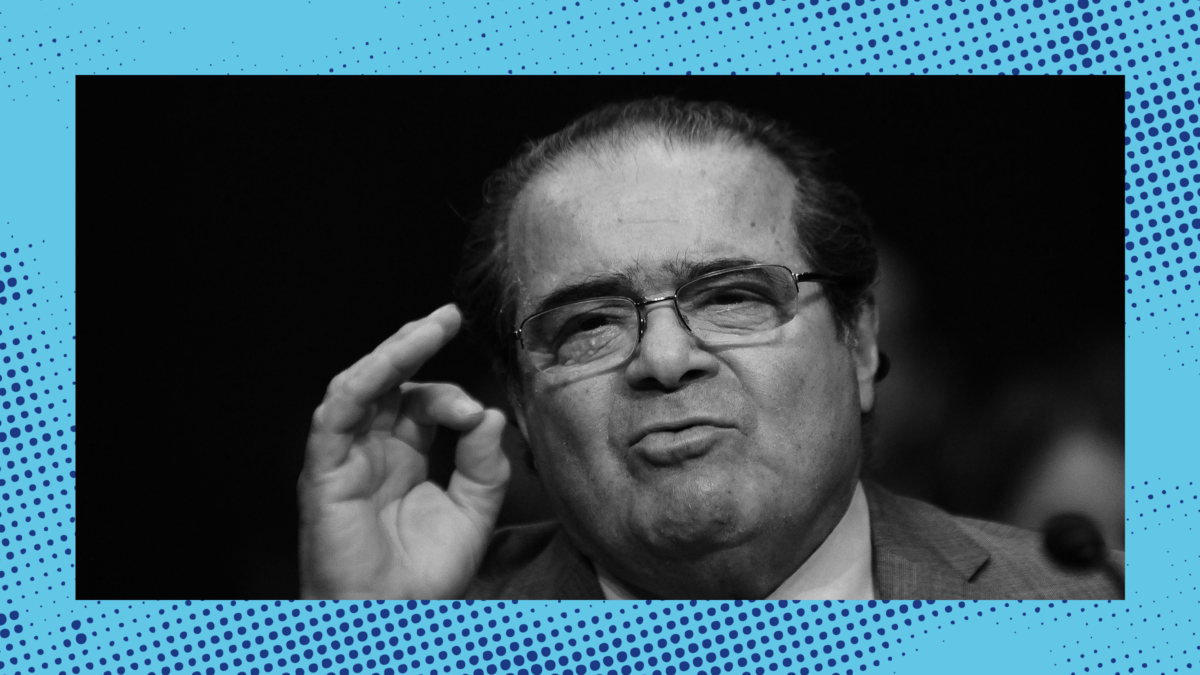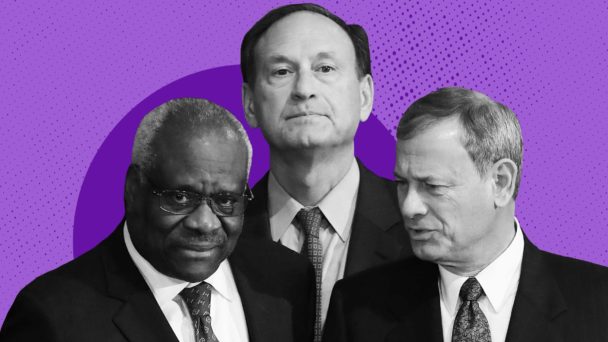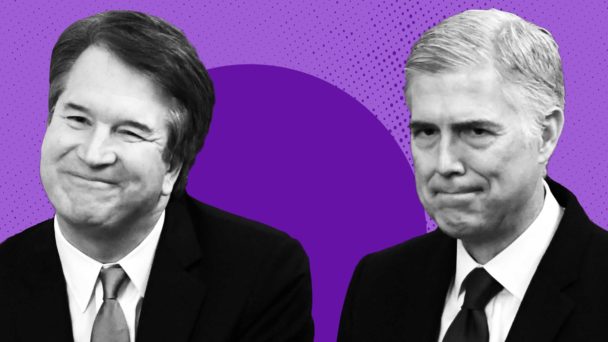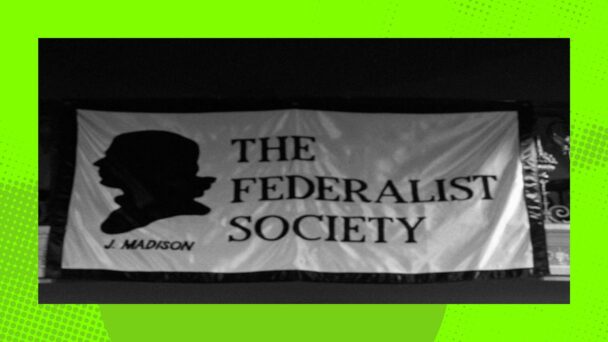On the campaign trail in 2016, Donald Trump said what every serious Republican presidential hopeful had to say when asked about the late Antonin Scalia: that he loved him, dearly, perhaps more than some members of his immediate family. “Justice Scalia was a remarkable person and a brilliant Supreme Court justice, one to the best of all time,” Trump said in a statement after news of Scalia’s death broke. “He is a person whom I held in the highest regard and will always greatly respect his intelligence and conviction to uphold the Constitution.”
For Trump, hitting the right notes of this song was particularly important, because Scalia’s death gave him the chance to court the establishment conservatives who, to that point, had treated his nascent candidacy as an elaborate stunt to juice ratings for another season of The Apprentice. During a debate, he reiterated his promise to “appoint judges very much in the model of Justice Scalia”—judges who, Trump explained as if he were listing the merits and demerits of various midtown Manhattan steakhouses, are “highly respected” and “very beautifully reviewed.”
Clip via YouTube
Generally speaking, federal judges stay out of electioneering; their official code of conduct states that they should not “publicly endorse or oppose a candidate for public office,” or otherwise “engage in any other political activity.” That said, judges are also regular people who care about politics, and can be a little more forthcoming among friends, family, and/or well-connected political operatives. In 2000, attendees at a small Election Night watch party hosted by a wealthy D.C. couple were treated to the sight of a forlorn Justice Sandra Day O’Connor describing news of Al Gore’s apparent victory as “terrible” before leaving the room.
A decade and a half later, there are clues that Trump’s admiration for Scalia was very much reciprocated. In her recent book about the Supreme Court during the Trump years, Nine Black Robes, CNN’s Joan Biskupic includes a fun detail about the Maureen Scalia’s election-year landscaping choices: No longer burdened by her late husband’s professional obligations, she put up a “large” Trump yard sign in front of their suburban Washington home. Trump appears to have bragged about earning Maureen’s support at various campaign rallies, but Biskupic’s source, per the endnotes, is a guy who had maybe an even greater vested interest in the election’s outcome: the Federalist Society’s Leonard Leo.
Maureen Scalia had a giant Trump sign in her yard for the 2016 election, but again, it should be stressed that Supreme Court justices aren’t politicians and are generally uninterested in politics pic.twitter.com/dzqaSmJEdq
— Jay Willis (@jaywillis) April 7, 2023
Obviously, one’s political preferences cannot be attributed automatically to their spouse. But Scalia spent years dabbling in the same strains of lib-owning grievance politics that Trump would later make famous. In a 2013 interview, for example, Scalia told New York magazine that he and Maureen had stopped subscribing to The Washington Post because of its “slanted and often nasty” treatment of conservative issues, and instead relied for their news on The Wall Street Journal and The Washington Times, whose editorial boards traffic exclusively in brain-dead right-wing talking points. Scalia even theorized that the Post had “lost subscriptions partly because they became so shrilly, shrilly liberal”—the same line Trump would deploy to mock The New York Times whenever it printed something he didn’t like.
Like Trump, Scalia was also an enthusiastic consumer of conservative talk radio. He seemed especially fond of Rush Limbaugh, who often took to the airwaves to voice his support for Scalia’s positions—and who, after Scalia’s death, posted on behalf of the family asking well-wishers to please stop spreading unhinged conspiracy theories that someone used a pillow to murder the justice in his sleep. When asked about his favorite host, Scalia named his “good friend” Bill Bennett, a guy who once asserted on the air, just as a thought exercise, that a failsafe crime reduction method would be to “abort every Black baby in this country.”
As president, Trump replaced Scalia with Neil Gorsuch, thus preserving the four-justice conservative coalition that would metastasize into a six-justice conservative supermajority a few years later. But Trump also found other, subtler ways to burnish Scalia’s legacy, nominating his son, Eugene, to be Secretary of Labor, and posthumously awarding the justice with a Presidential Medal of Freedom, which Maureen accepted on his behalf in 2018. At the ceremony, upon learning that the couple had had nine children, Trump honored Antonin Scalia the only way he knew how: with a joke about how much sex he’d had.
Trump commends Antonin Scalia for having a lot of sex pic.twitter.com/YKkgw027QA
— Aaron Rupar (@atrupar) November 16, 2018
Scalia’s death, and his replacement by a like-minded justice, seems to have made some members of his inner circle more comfortable than they might otherwise be with dropping hints about his views on politics during the last few months of his life. “Justice Scalia thought it was most refreshing to have a candidate who was pretty much unfiltered and utterly frank,” Bryan Garner, a legal dictionary editor who co-wrote several interminable books with Scalia, revealed in a 2018 interview. Garner added that Scalia was “fascinated” by Trump’s outspokenness, and appreciated “seeing something a little more genuine than a candidate whose every utterance is airbrushed.”
(Ever the lawyer, Garner cautioned that Scalia’s musings came early in the election, and that he would not have necessarily endorsed “everything that’s happened since.” It is unclear whether Garner was disclaiming Scalia’s hypothetical support for, say, Trump’s defense of neo-Nazis in Charlottesville, or his racist invocation of “shithole countries,” or his xenophobic attacks on a Hispanic federal judge presiding over a Trump University fraud lawsuit, or his several racist and xenophobic Muslim bans, or some other spectacularly bigoted Trump-era policy that Antonin fucking Scalia would have ostensibly found objectionable.)
Again, confirmation of a judge’s support for a given candidate is pretty rare, since judges not named Clarence Thomas typically steer clear of even the appearance of involvement with electoral politics. But setting aside the mores imposed by their respective offices, it’s not surprising to learn that two elderly blowhards from Queens would develop a mutual appreciation for each other’s act: Trump and Scalia became two of the conservative movement’s most beloved superstars by tapping into its roiling id, mixing unvarnished bigotry with unearned bravado and dismissing any and all criticism as a badge of honor. Although Scalia didn’t live to see Trump’s presidency, he would have loved every minute of it, because it was powered by the same fuck-your-feelings ethos that he spent his entire life championing. The only real difference between the two men is that one sometimes bothered to translate his reactionary politics into dry legalese, and wore a robe when he went out in public.




